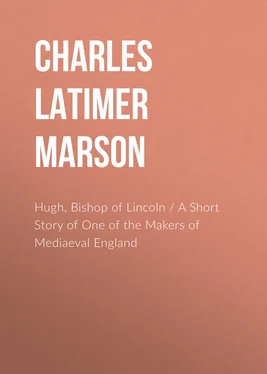Charles Latimer Marson - Hugh, Bishop of Lincoln / A Short Story of One of the Makers of Mediaeval England
Здесь есть возможность читать онлайн «Charles Latimer Marson - Hugh, Bishop of Lincoln / A Short Story of One of the Makers of Mediaeval England» — ознакомительный отрывок электронной книги совершенно бесплатно, а после прочтения отрывка купить полную версию. В некоторых случаях можно слушать аудио, скачать через торрент в формате fb2 и присутствует краткое содержание. Жанр: foreign_prose, foreign_antique, на английском языке. Описание произведения, (предисловие) а так же отзывы посетителей доступны на портале библиотеки ЛибКат.
- Название:Hugh, Bishop of Lincoln / A Short Story of One of the Makers of Mediaeval England
- Автор:
- Жанр:
- Год:неизвестен
- ISBN:нет данных
- Рейтинг книги:3 / 5. Голосов: 1
-
Избранное:Добавить в избранное
- Отзывы:
-
Ваша оценка:
- 60
- 1
- 2
- 3
- 4
- 5
Hugh, Bishop of Lincoln / A Short Story of One of the Makers of Mediaeval England: краткое содержание, описание и аннотация
Предлагаем к чтению аннотацию, описание, краткое содержание или предисловие (зависит от того, что написал сам автор книги «Hugh, Bishop of Lincoln / A Short Story of One of the Makers of Mediaeval England»). Если вы не нашли необходимую информацию о книге — напишите в комментариях, мы постараемся отыскать её.
Hugh, Bishop of Lincoln / A Short Story of One of the Makers of Mediaeval England — читать онлайн ознакомительный отрывок
Ниже представлен текст книги, разбитый по страницам. Система сохранения места последней прочитанной страницы, позволяет с удобством читать онлайн бесплатно книгу «Hugh, Bishop of Lincoln / A Short Story of One of the Makers of Mediaeval England», без необходимости каждый раз заново искать на чём Вы остановились. Поставьте закладку, и сможете в любой момент перейти на страницу, на которой закончили чтение.
Интервал:
Закладка:
His great affectionate heart poured itself out upon wild birds and squirrels which came in from the beech and pine woods, and learned to feed from his platter and his fingers. It is difficult to read with patience that his prior, fearing lest he should enjoy these innocent loves too much, and they would “hinder his devotion,” banished these pretty dears from the dreary cell. But in charity let us suppose that the prior more than supplied their place, for Hugh was told off to tend a weak old monk, to sing him the offices, and to nurse the invalid. This godly old man, at once his schoolmaster and his patient, sounded him whether he wished to be ordained priest. When he learned that, as far as lay in Hugh he desired nothing more, he was greatly shocked, and reduced his nurse-pupil to tears by scolding him for presumption; but he presently raised him from his knees and prophesied that he would soon be a priest and some day a bishop. Hugh was soon after this ordained priest, and was distinguished for the great fervour of his behaviour in celebrating the Mass “as if he handled a visible Lord Saviour”—a touching devoutness which never left him, and which contrasted strikingly with the perfunctory, careless or bored ways of other priests. He injured his health by over-abstinence, one effect of which was to cause him to grow fat, Nature thus revenging herself by fortifying his frame against such ill-treatment.
In the talk time after Nones, the brothers had much to hear about the storms which raged outside their walls. It is rather hard for us nowadays to see things through Charterhouse spectacles. There is our lord the Pope, Alexander III., slow and yet persistent, wrestling hard with the terrible Emperor Frederick Barbarossa, who is often marching away to seiges of Milan, reducing strong rogues and deeply wronging the church (whose forged documents are all purely genuine). Then what a hubbub there is in the church! Monstrous anti-popes, one of whom, Victor, dies, and a satanic bishop Henry of Liége consecrates another, Pascal, and the dismal schism continues. Then our lord Alexander returns to Rome, and the Emperor slaughters the Romans and beseiges their city and enthrones Pascal. There are big imperial plans afoot, unions of East and West, which end in talk: but Sennacherib Frederick is defeated by a divine and opportune pestilence. Then Pascal dies, and the schism flickers, the Emperor crawls to kiss the foot of St. Peter, and finally, in 1179, Alexander reigns again in Rome for a space. Meantime, Louis VII., a pious Crusader, and dutiful son of the Regulars, plays a long, and mostly a losing, game of buffets with Henry of Anjou, lord of Normandy, Maine, Touraine, Poitou, Aquitaine and Gascony, and leader of much else besides, King also of England, and conqueror of Ireland—a terrible man, who had dared to aspire to hang priestly murderers. He has forced some awful Constitutions of Clarendon upon a groaning church, or a church which ought to groan and does not much, but rather talks of the laws and usage of England being with the king. But the noble Thomas has withstood him, and is banished and beggared and his kith and kin with him. The holy man is harboured by our good Cistercian brothers of Pontigny, where he makes hay and reaps and see visions. He is hounded thence. These things ignite wars, and thereout come conferences. Thomas will not compromise, and even Louis fretfully docks his alimony and sends him dish in hand to beg; but he, great soul, is instant in excommunication, whereafter come renewed brawls, fresh (depraved) articles. Even the king’s son is crowned by Roger of York, “an execration, not a consecration.” At last (woeful day!) Thomas goes home still cursing, and gets his sacred head split open, and thus wins the day, and has immense glory and sympathy, which tames the fierce anti-anarchist king. He, too, kneels to our lord Alexander, and swears to go crusading in three years’ time, meanwhile paying Templars to do it for him. All this comes out in driblets after Nones, and brings us to 1171 a.d., brother Hugh being aged about one and thirty. When the old monk died Hugh was given another old man to wait upon—Peter, the Archbishop of Tarentaise, who came there often for retreat and study. This renowned old man had been a friend of St. Bernard, and was a great stickler and miracle worker for Alexander III., and he was a delegate to make peace between Henry and Louis, when he died in 1174. Hugh found his quotations, compiled any catena he wished to make, retrieved saintly instances, washed his feet, walked with him, and sat with him on a seat between two large fir trees, which seat “miraculously grew no higher, as the trees grew.” In this manner Hugh knew and was known of the outside world, for Archbishop Peter was a man of large following and acquaintance.
And now Hugh is made, wincingly, the procurator or bursar of the Grande Chartreuse, after he has spent eight years there, and is plunged in a sea of worldly business. The prior makes good use of his tact, business capacity, and honourable nature. He had thought and read to some purpose, for he ruled the lay brothers with diligence, and instructed the monks with great care, stirring up the sluggish and bitting the heady into restfulness. He did his worldly work vigorously, and turned it swiftly to spiritual gain. He had strong wine of doctrine for the chapter-house, milk for the auditorium. The secular people, if they were rich, he taught not to trust in riches; if they were poor, he refreshed them with such rations as the Order allowed. If he had nothing else, he always had a kind and cheery word to give. Among the travellers must have been many noble postmen, who carried letters in their hands and messages in their heads from Henry to Humbert of Maurienne, who held the keys of all the Alpine roads to Italy and Germany and whose infant daughter was betrothed to the boy John Lackland with dowries disputable, whereat Henry junior rebels, and makes uncommon mischief. The procurator was keen and accurate in his work. He never mislaid the books, forgot, fumbled, or made a “loiter,” morantia , as they called it, when the office halted or was unpunctual. The lay brethren did not have to cough at any trips in his reading, which was their quaint way of rebuking mistakes.
Henry II. was reconciled in 1172 and his crusade was to begin in 1175; but during these years his dominions were in constant flame. Scotland and France harried him. His sons leagued against him. His nobles rose. He fought hard battles, did humble penances at St. Thomas’ tomb, and came out victorious, over his political and ecclesiastical opponents too, and began again the ordering of his unruly realms. What a rough and tumble world the Chronicles reveal as we turn them over! There is a crusade in Asia Minor in 1176. Manuel Commenus relates his success and failure. There are heretics in Toulouse who are Puritans, half Quaker and half Arian, condemned by a Council of Lombers, 1176. Next year Henry seems to have begun his penance, which was commuted from a crusade into three religious foundations, and rather shabbily he did it. Some people try to put Newstead in Selwood in the list, but this was founded in 1174; and Le Liget has been mentioned, a Charterhouse in Touraine founded in 1178. The most probable explanation is this. Henry tried to do the penance (α) by buying out the Secular Canons of Waltham at a price determined by Archbishop Richard. He replaced these by Canons Regular under Walter de Cant. He then endowed them handsomely and had papal authority for this. (β) He found this so expensive that he tried to do the other two more cheaply. A scandal had arisen in Amesbury. He expelled the incontinent nuns, and brought over from Font Evroult a colony of more devout ladies in their room. The chroniclers show that this evasion was severely commented upon, and we may conclude that Le Liget was a tardy substitute—a cheap strip of forest land granted to an order which was celebrated for its dislike of covetousness, and whose rules required manual labour and a desert (and so valueless) land. Le Liget, be it noticed, is founded after the peace of Venice has given more power to the Papal elbow. The Lateran Council is also a little threatening towards King Henry in March, 1179, particularly on the question of the ferocity of mercenaries. Young Philip Augustus is also evidently succeeding his waning father, and generally speaking it is better to be conciliatory and to admit that the Amesbury plan was perhaps insufficient. At any rate, it is well to found another house: Carthusians of course, for they are holy, popular, and inexpensive. Henry, who was generous enough for lepers, hospitals, and active workers, did not usually care very much for contemplative orders, though his mother, the Empress Matilda, affected the Cistercians and founded the De Voto Monastery near Calais, and he inherited something from her. These considerations may have first prompted and then fortified Henry’s very slow and reluctant steps in the work of founding Witham, in substance and not in shadow. It is also quite possible that he had not entirely given up the notion of going on a crusade after all.
Читать дальшеИнтервал:
Закладка:
Похожие книги на «Hugh, Bishop of Lincoln / A Short Story of One of the Makers of Mediaeval England»
Представляем Вашему вниманию похожие книги на «Hugh, Bishop of Lincoln / A Short Story of One of the Makers of Mediaeval England» списком для выбора. Мы отобрали схожую по названию и смыслу литературу в надежде предоставить читателям больше вариантов отыскать новые, интересные, ещё непрочитанные произведения.
Обсуждение, отзывы о книге «Hugh, Bishop of Lincoln / A Short Story of One of the Makers of Mediaeval England» и просто собственные мнения читателей. Оставьте ваши комментарии, напишите, что Вы думаете о произведении, его смысле или главных героях. Укажите что конкретно понравилось, а что нет, и почему Вы так считаете.












